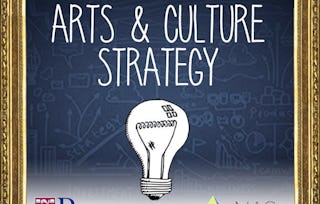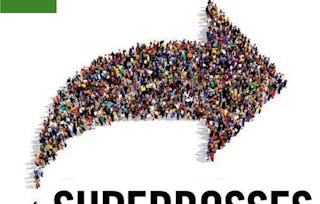What makes a successful arts and cultural organization? Led by DeVos Institute Chairman Michael M. Kaiser and President Brett Egan, this course will introduce you to a management theory called the Cycle which supports thriving arts and cultural organizations. Learning from our work with managers from over 80 countries around the world, the DeVos Institute developed the Cycle as a simple, but powerful tool to assist managers in their effort to respond to an increasingly complex environment and propel their institutions to excellence.

The Cycle: Management of Successful Arts and Cultural Organizations

The Cycle: Management of Successful Arts and Cultural Organizations


Instructors: Michael M. Kaiser
28,604 already enrolled
Included with
737 reviews
Skills you'll gain
Details to know

Add to your LinkedIn profile
6 assignments
See how employees at top companies are mastering in-demand skills

There are 6 modules in this course
Welcome! This first week you will be introduced to the course structure and learn the key principles of the Cycle, a management theory which supports thriving arts and cultural organizations and which serves as the framework for the course. The Cycle proposes that: When bold art is marketed aggressively, an organization attracts a family of energized ticket-buyers and patrons. The income produced by this family is reinvested in more art that, when marketed well, builds a larger, even more diverse family. When this cycle repeats year after year, the organization incrementally and sustainably builds capacity, presence, and health. Following the introductory lectures, you will learn more about the Cycle by reading the executive summary, reviewing answers to frequently asked questions, and completing an introductory quiz. As a reminder, if you are taking this course as a student or enthusiast not affiliated with a specific organization, we recommend you select an organization of your choosing to reference as you make your way through the course!
What's included
14 videos7 readings1 assignment
This week, you will learn the benefits of planning your programs further in advance and learn strategies for planning your organizations programs over a five-year time frame. The Cycle proposes that each organization has a rolling, 3-5 year programming plan that is bold, mission-driven, and occasionally surprising. Further, it asks that each organization's programming is the best example of its kind in its environment that forms the basis for aggressive marketing, successful fundraising, and incremental growth in institutional capacity. Following the series of lectures, answers to frequently asked questions, and case studies, you will have the opportunity to apply the principles of long-term artistic planning to your organization using the planning activity provided.
What's included
10 videos5 readings1 assignment
This week introduces institutional marketing, one of two marketing perspectives that is used to aggressively compete for audience attention and loyalty. Institutional marketing is the creative use of organizational assets to create spikes in awareness, energy, and enthusiasm around an organization, beginning with the presentation of transformational art itself and continuing through activities that heighten awareness about the people, process, and other institutional assets behind that art. Following the series of lectures, answers to frequently asked questions, and case studies, you will have the opportunity to apply the principles of institutional marketing to your organization using the planning activity provided.
What's included
8 videos5 readings1 assignment
Programmatic marketing is the second marketing perspective that the Cycle describes. Programmatic marketing can be defined as the tactics used to identify and target potential audiences for each attraction, create awareness and demand, and drive a sale (of tickets, classes, services, or other experiences). Effective programmatic marketing extends beyond the transaction to contextualize each offering, ensure a high-quality experience, and lay the groundwork for a long-term relationship with the buyer. Following the series of lectures, answers to frequently asked questions, and case studies, you will have the opportunity to apply the principles of programmatic marketing to your organization using the planning activity provided.
What's included
9 videos4 readings1 assignment
An organization’s family makes up the third aspect of the Cycle. The family is an energized, enthusiastic group of ticket-buyers, board members, donors, trustees, and volunteers that anchors an organization’s financial health through its commitment of time, talent, connections, and financial resources. The heart of the family consists of a joyous, engaged, and excited board of directors. If your organization has a board, you will have the opportunity to apply the principles to your organization's board following the lectures and case studies.
What's included
11 videos4 readings1 assignment
Fundraising, the final aspect of the Cycle, consists of a strategy for sustainable growth that joins long-term artistic goals, and energized family, and logical options for investment to build organizational resources donor by donor, week by week, month by month, and year by year. Effective fundraising pairs each family member with a logical, financial action in support of the organization’s mission. Following the series of lectures, answers to frequently asked questions, and case studies, you will have the opportunity to apply the principles of fundraising to your organization by developing, or evaluating, your membership program, major donor program, or targeted campaign.
What's included
9 videos14 readings1 assignment
Instructors


Offered by
Explore more from Music and Art
 Status: Preview
Status: PreviewUniversità Bocconi
 Status: Preview
Status: PreviewVanderbilt University
 Status: Preview
Status: PreviewUniversity of Pennsylvania
 Status: Free Trial
Status: Free TrialDartmouth College
Why people choose Coursera for their career

Felipe M.

Jennifer J.

Larry W.

Chaitanya A.
Learner reviews
- 5 stars
85.75%
- 4 stars
11.53%
- 3 stars
2.44%
- 2 stars
0.13%
- 1 star
0.13%
Showing 3 of 737
Reviewed on Jan 16, 2021
This course has really changed the way I look at arts organization management. I feel much more confident and eager to try the methodology taught in The Cycle.
Reviewed on May 19, 2018
The Cycle was an eye-opener in many ways. I always thought Arts Management required more artistic intuition than management knowledge, but this framework gave me a whole new perspective.
Reviewed on Dec 1, 2018
I had already read The Cycle but this class was a good refresher of the book and I like the practical activities.

Open new doors with Coursera Plus
Unlimited access to 10,000+ world-class courses, hands-on projects, and job-ready certificate programs - all included in your subscription
Advance your career with an online degree
Earn a degree from world-class universities - 100% online
Join over 3,400 global companies that choose Coursera for Business
Upskill your employees to excel in the digital economy
Frequently asked questions
To access the course materials, assignments and to earn a Certificate, you will need to purchase the Certificate experience when you enroll in a course. You can try a Free Trial instead, or apply for Financial Aid. The course may offer 'Full Course, No Certificate' instead. This option lets you see all course materials, submit required assessments, and get a final grade. This also means that you will not be able to purchase a Certificate experience.
When you purchase a Certificate you get access to all course materials, including graded assignments. Upon completing the course, your electronic Certificate will be added to your Accomplishments page - from there, you can print your Certificate or add it to your LinkedIn profile.
Yes. In select learning programs, you can apply for financial aid or a scholarship if you can’t afford the enrollment fee. If fin aid or scholarship is available for your learning program selection, you’ll find a link to apply on the description page.
More questions
Financial aid available,

